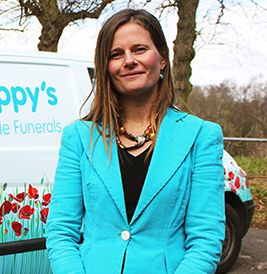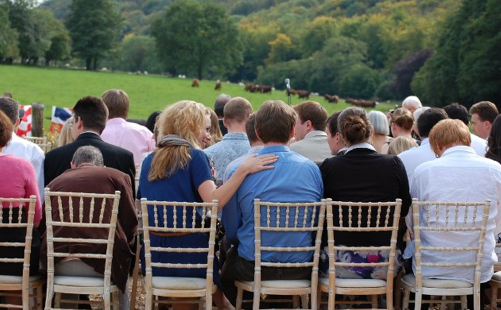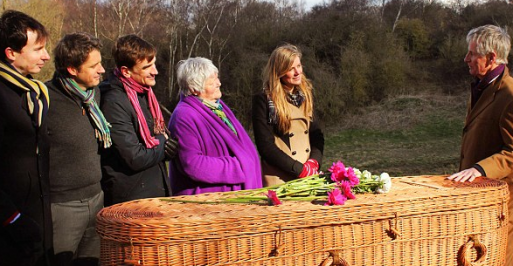Today, SevenPonds speaks with funeral director Poppy Mardall of Poppy’s Funerals, which serves the Greater London area and beyond. Poppy’s company provides funeral services that are all rooted in one concept: simplicity. This virtue can be seen in every aspect of Poppy’s Funerals, which values honesty, affordability, and fostering a personal connection with its clients. With a background in Art History and years of working at Sotheby’s, Poppy falls far from the stereotype of your traditional funeral director. We spoke with her about death, dying, and taking the plunge into the funeral business.
MaryFrances: How did you find yourself making the jump to funeral directing?
Poppy: I’ve tried so hard to draw a parallel between Sotheby’s and what I do now. And there really isn’t one (laughs).
MaryFrances: Though you could say both require a kind of aesthetic sensitivity.
Poppy: Oh, sure. And I’m quite a creative person, but not really interested too much in “detail,” which is what people say art and funerals are all about. Like, which colour ribbon? Etc. To me, those details feel much more like event planning. That’s a side of funerals I’m not interested in as much.
MaryFrances: So what’s the side that interested you enough to start your own funeral service?
Poppy: Before Poppy’s Funerals, I would volunteer at hospice. I also volunteered as a Samaritan for a charity telephone network, which is a kind of listening service designed for people who are suicidal. It was just such meaningful work. And as my job got bigger and bigger I felt my volunteer time getting squashed, and I had to do something about that. I needed to make that my job, not just my Wednesday evening.
I also had a bunch of things happening in my personal life. My mum and dad had cancer within a couple of years of one another. My family had otherwise been in good health for my entire life. So I quit my job, thinking, I’ve got some big ideas around birth and death and love – I want to help people in a more critical way. Then I went to Ghana for a month and got typhoid.
MaryFrances: Really?
Poppy: I was only very ill for a month, and the other seven were just like a 19th century novel of not recovering very quickly.
MaryFrances: A la a bedridden Jane Austen heroine.
Poppy: Exactly (laughs). And that’s when I really started researching more about death and dying. The more I researched, the more I felt I needed to help others who didn’t know how to handle death.
So I spent a month with an undertaker in a mortuary, which you know I’m not particularly passionate about – but I needed to understand every aspect of the business. I was really turned off by the idea of embalming and then dressing the dead in pink, frilly satin in a plastic coffin.
MaryFrances: The lipstick and frills do make things unnecessarily eerie.
Poppy: That’s what I learned — that it’s not death that’s eerie, it’s what the industry does to the dead that’s eerie.
Poppy’s Three Values for Simple Funeral Planning:
1) Honesty
2) Choice
3) Affordability
MaryFrances: You don’t look like the traditional funeral director!
Poppy: No (points to green company polo), and we do do a lot of traditional looking funerals, but people come to us because they say they’ve heard we’re rather clear, and very honest – which sounds almost ridiculous, you know, to say, “Oh! Thank god, you’re normal!”
MaryFrances: Well funerals are usually something we only come into contact with a handful of times. Otherwise they rest in this kind of shushed, intimidating space.
Poppy: People are scared to face death. That’s why we we’re here.
MaryFrances: And Poppy’s Funerals brings a kind of simplicity and normalcy to making a funeral planning checklist.
Poppy: That’s the whole idea. Our clients have one point of contact throughout who can meet them at their home, on their turf. We’ll also be with you at the crematorium and burial ground. We’ll hand-deliver the ashes home. It’s about returning a human connection that is missing.
MaryFrances: Can you tell me about the materials you use for coffins and cremation vessels, etc.?
Poppy: Traditional coffins tend to come with a layer of plastic, but we found a company that makes these natural bamboo and willow coffins – just lovely. They use these beautiful, calico cotton-like wrapping sheets. Very simple. No garish or frilly garments at all.
MaryFrances: It is pretty odd that we don’t get to pick our last and, arguably, most impressionable outfit.
Poppy: I mean, the idea that you’d go and see your dad in this pink coffin is just odd to me, if it didn’t fit his personality. Very unnatural.
MaryFrances: Your approach also seems very environmentally friendly.
Poppy: It is – and while I do care about the environment, my real goal is to focus on how a funeral experience affects the family. I’m not a massive eco-warrior. I do care about nature, but I mostly care about people. And I just feel like people are being fobbed off with poor quality products and experiences in funeral planning.
MaryFrances: Thanks, Poppy.
Poppy: Thank you.
Related:
- Learn more about choosing a green or natural burial.
- Funeral director Shari Wolf explores the benefits of choosing natural death services over other funeral options. Read SevenPonds’ interview with her here.
- Elegant Garments for A Green Burial: Designer Pia Interlandi creates beautiful biodegradable funeral clothes.

 What is the ‘Simple’ Approach to Funeral Planning? An Interview with Poppy Mardall of Poppy’s Funerals
What is the ‘Simple’ Approach to Funeral Planning? An Interview with Poppy Mardall of Poppy’s Funerals





 Funeral Favors Offer Visitors a Tangible Memento
Funeral Favors Offer Visitors a Tangible Memento
 “Comeback” by Prince
“Comeback” by Prince
 “Other Side” Documents Woman’s Fight To Die As She Wishes
“Other Side” Documents Woman’s Fight To Die As She Wishes














